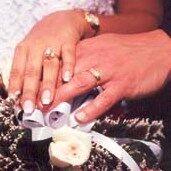
Britain’s Broken Society
The marriage rate in Britain has collapsed to its lowest point since its government began keeping statistics in 1862. Even when discounting population growth, the numbers are embarrassingly low. According to Britain’s Office for National Statistics (bons), in 2006, the UK recorded a little over 228,000 marriages—its lowest number since 1895, when its population was barely half what it is today.
In response to the study, the Daily Mail quoted British researcher Patricia Morgan as saying that the government had succeeded in “eradicating” marriage. “This is what they have tried to achieve and they should be congratulating themselves,” Morgan said. “But it is a disaster for children, families and society.” The British government has indeed played a significant role in accelerating family breakdown. As the Sunday Telegraph pointed out last year (July 15, 2007),
Over the past decade, Labor has presided over the almost total destruction of any official recognition that marriage is something to be encouraged, to the point where most official forms no longer require, indeed no longer allow, people filling them in to state whether they are married. It has become government policy to accept that co-habitation should be recognized as “just as good” and “equally as valid a choice” as marriage, and that all trace of stigma attached to having children out of wedlock should be removed.
Thus, in legislating policies and entitlements tailor-made for society’s exceptions, the exceptions have now become the rule.
That’s not to say that Labor is the root cause of Britain’s family breakdown. As the bons study notes, the institution of marriage has been steadily eroding since the early 1970s. Consider these recent statistics:
The breakdown of family life is Britain’s most urgent crisis today. Every week, it seems, newspapers in the UK shed additional light on how wrecked the British family actually is. The once United Kingdom has not only lost its empire, what’s left at home is rotten to the core.
Earlier this year, the Royal United Services Institute (rusi) published a sobering report about Britain’s national security risks. (You can view a pdf of the report here). The report’s authors argue that British weakness at home is exposing the country to dangerous threats from abroad and within its borders. “The ‘war on terror’ is with us now in all its ugliness,” the report asserts. It then raised a number of important questions it said the British government needed to answer, as well as choices to be made. “In making our choices, however, we need to know who we are ourselves and what we stand for,” it said. “Once we know these things and admit them, we can restore our divided house to harmony and thence to security” (emphasis mine throughout). Yet, in addressing Britain’s divided house, notice what the report concentrates on:
The United Kingdom presents itself as a target, as a fragmenting, post-Christian society, increasingly divided about interpretations of its history, about its national aims, its values and in its political identity. That fragmentation is worsened by the firm self-image of those elements within it who refuse to integrate. This is a problem worsened by the lack of leadership from the majority which in misplaced deference to “multiculturalism” failed to lay down the line to immigrant communities, thus undercutting those within them trying to fight extremism.
But unless Britain is willing to fight extremism within the basic building block of society—the nuclear family—how will it find strength to confront its enemies abroad? Britain’s interpretations of history, its national aims, values and political identity all begin at home—within individual families of British society.
In her book Londonistan, Melanie Phillips points to the importance of America’s alliance with Britain in its war against terrorism. Great Britain, she said, is America’s most important ally. “The United States may provide the muscle to defend the free world against Islamic fascism, but Britain—the originator of the values that America defends—provides the backbone.”
And the solid family structure is what has traditionally held that backbone together. But over the past two generations, family life in Britain has undergone a radical transformation. The Judeo-Christian system of ethics has collapsed. Government programs are laden with all sorts of incentives that encourage deviant behavior. Forty percent of British citizens receive some kind of government subsidy. It has become a culture of dependency where divorce, out-of-wedlock births and juvenile crime are sky high.
Even marriage is being called into question.
Why Marriage?
Well ahead of his time, Herbert Armstrong wrote this 40 years ago: “Some psychologists, taking a new look at the institution of marriage, are voicing shocking predictions for the near future. Indeed, in their professional eyes, the trend toward obsolescence of the marriage custom has already started, and is gaining momentum!”
Marriages are not only breaking down, he went on to write in 1968, even their usefulness and desirability are being seriously questioned!
Imagine British citizens questioning the usefulness of marriage 50 or 60 years ago. Yet today, we have drifted so far from our Maker that now we question the very institutions He ordained! According to the bons study, only 34 percent of British marriages even occur within a religious setting, which is half what it was in 1991—just 17 years ago. Look how far and how fast we have drifted away from anything having to do with the Bible.
We take marriage for granted! If, as many assume, man evolved from apes and monkeys over the course of millions of years, then, as Mr. Armstrong asked, where along the evolutionary line did marriage begin? Animals have never married. Why and when did it begin with mankind?
Or, if you believe that God created man, why does the largest Christian denomination on Earth teach that the highest spiritual state is that of an unmarried celibate?
These questions are answered in our free booklet Why Marriage! Soon Obsolete?
